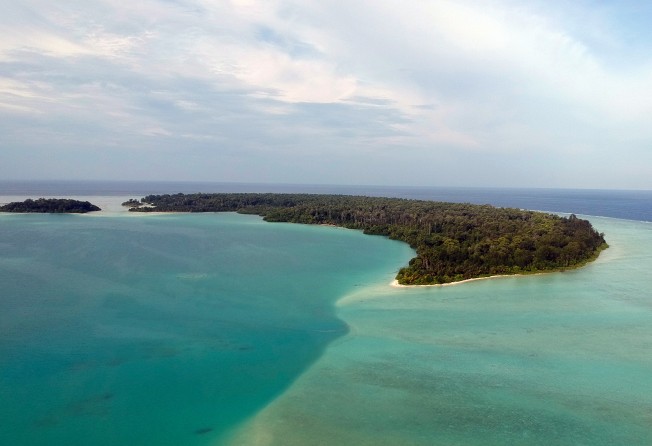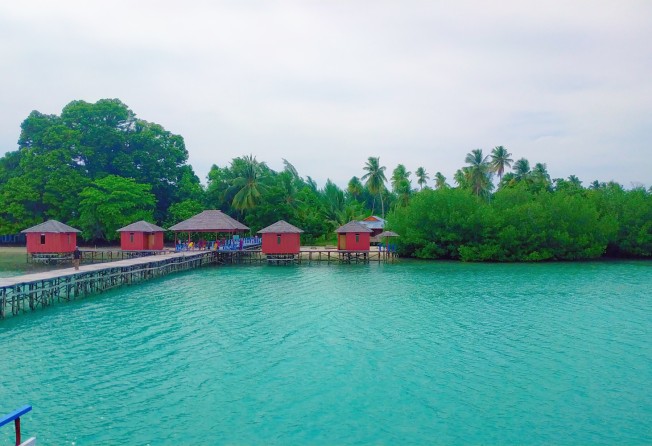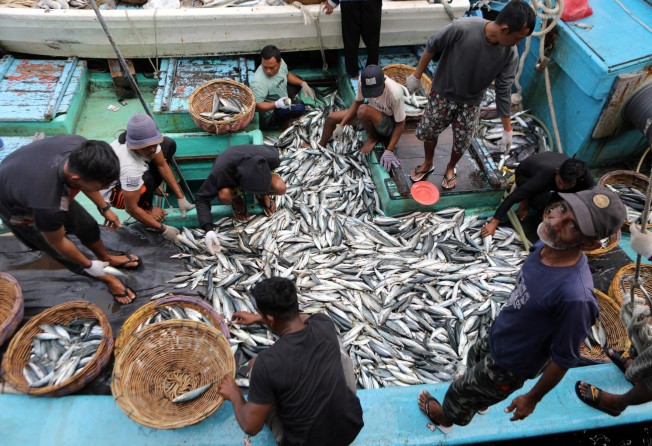Backlash in Indonesia over ‘eco-friendly’ development plans for pristine Widi Islands
- Environmental groups fear the project, dubbed an ‘opportunity of a lifetime’, would destroy the local environment and livelihoods
- The archipelago of some 100 islands is home to endangered marine life and about 600 documented species of marine mammals, birds, insects and lizards

Environmentalists are outraged over an Indonesian firm’s decision to auction off the rights to develop a group of pristine, uninhabited islands, amid concerns that private tourism would destroy the biodiversity-rich area.
Leadership Islands Indonesia (LII), a Bali-based foreign capital firm, is working with British auction house Sotheby’s to seek investors for what it calls “a potential eco-conscious development” in the Widi Islands – an archipelago of some 100 islands that’s home to endangered marine life such as blue whales and about 600 documented species of marine mammals, birds, insects and lizards.
The Sotheby’s listing describes the deal as an “opportunity of a lifetime”, with some 10,000 hectares available for “at least 50 luxury eco-resort/residency ‘keys’”, ranging from one- to eight-bedroom villas to private estates, with a maximum of 500 keys across 17 islands. A planned 1,000-metre private airstrip will also connect the islands to Bali, Singapore, Hong Kong and Australia’s Cairns.
LII holds the exclusive rights to preserve the entire archipelago, which has a total land area of some 85,000 hectares, and the surrounding ocean inside the Marine Protected Area in North Maluku, a 375,000-hectare region that encompasses the Widi Islands.
Both companies have noted in the listing that “Indonesian law does not permit for private ownership of islands, however shares in a business with development rights can be sold to anyone”.
The winning party would acquire interests in LII and work with the firm “to conserve and sustainably develop” the islands, the listing said. Aside from eco-lodges, LII also plans to build a conservation centre with research programmes on issues such as tagging, tracking and monitoring of iconic and critically-endangered species.
But environmentalists have said that evidence shows an eco-tourism project would not be “entirely eco-friendly”.
“In many places, tourism marginalises people, especially if this is private tourism,” said Parid Ridwanuddin, the coastal and marine campaign manager for Indonesian environmentalist group Walhi.
“When we talk about ecology, they would need materials to build resorts, so [the natural ecosystem] would definitely be damaged. Walhi urges that the licences of the companies that are proven unable to carry out their obligations should be evaluated and their permits revoked, no room for investment should be allowed.”

‘Transferring to foreign hands violates the law’
In 2015, the governments of North Maluku province and South Halmahera regency signed a memorandum of understanding with LII to develop the tourism sector in the Widi Islands. LII was given the rights to manage the pristine islands for 35 years and turn them into an eco-tourism hub, as well as the responsibility to boost local communities’ livelihoods.
Seven years on, the firm has yet to develop the islands due to a lack of funds, hence the auction to find investors, said Interior Minister Tito Karnavian in response to the controversy.
When the auction listing first emerged, local media and critics of the project saw it as a sale of islands to foreigners.
“They’re looking for foreign investors. That’s why they put it up for auction,” Tito told reporters last week.. “The aim is not to sell the islands, but to attract foreign investors. And that is fine [according to Indonesian laws].”
On Wednesday, he reiterated again that “transferring [the islands] to foreign hands violates the law”.
Among the critics is Anthony Budiawan, managing director of Jakarta-based research body Political Economy and Policy Studies, who said on Twitter that the “auction is essentially selling” the islands to foreign investors.
“If you want to attract investors, it’s called equity participation, and the organiser is not an auction house, but the stock exchange or a securities company,” he said.
Following the backlash, the North Maluku government has reportedly said it would temporarily freeze LII’s exclusive rights to the islands until “the company can show the feasibility of the land use”.
The South Halmahera government has also requested an evaluation of the company’s licences as it has not met its obligation to develop eco-tourism in the islands, since the MOU was signed in 2015.
LII denied the reports and told This Week in Asia that its licences have not been suspended.

Fears for local communities
LII spokesman Okki Soebagio said in a statement that “less than 0.005 per cent of the reserve” would be developed, making it “the lowest density private island resort development in the world”.
“The Maldives, by comparison, allows up to a 30 per cent development ratio,” Okki said.
While the firm’s master plan underlines that tourism in the islands would not be on similar scale to Bali, Parid of Walhi said any eco-tourism in the area should put the local community at its heart, instead of foreign tourists with deep pockets.
“We have lots of evidence on the ground that the people have already done spatial and water use management. They have contributed to maintaining the sustainability of marine space [in the Widi Islands],” he said.
“Don’t just invite investors from abroad and then see it as a form of success. We think that’s wrong. They should invest in what the people are already doing there to protect the ecosystem, that’s the real investment.”
Parid also questioned whether local fishermen would still be able to fish in the waters around the islands once the lodges were built.
“The islands are invaluable to the 6,000 people that live in the six villages nearby. The Indonesian government must totally evaluate all marine conservation areas because these are used as instruments for tourism development on a large scale, which is typically accompanied by the practice of marginalising the community,” he said.
In its statement, LII said that in its master plan, there would be areas marked as conservation zones, where only “scientists on a specific scientific mission are allowed to go”, a tourism-use zone, where no fishing activities would be allowed, and “traditional, sustainable fishing” zone for the communities.
“The local fishing communities were fully consulted in this planning process as per government regulations,” it said.
Despite the controversy, LII and Sotheby’s said they would proceed with the online auction, which is scheduled for January 24.